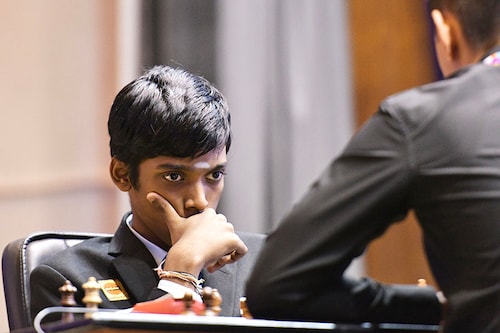Why chess, and Praggnanandhaa, made a cameo appearance in the FM's Budget speech
With Viswanathan Anand kicking off India's dominance and now mentoring young prodigies, India is fast becoming the chess powerhouse of the world


During her Budget speech, Finance Minister (FM) Nirmala Sitharaman made a quick segue to give a shoutout to teenage chess prodigy R Praggnanandhaa.
“Chess prodigy and our Number One ranked player Praggnanandhaa put up a stiff fight against the reigning World Champion Magnus Carlsen in 2023. Today, India has over 80 chess Grandmasters (GM) compared to a little over 20 in 2010," she said, while lauding the country’s youth for scaling new heights in sports.
While much of the credit for the growth of chess goes to Viswanathan Anand, a five-time World Champion and India’s first Grandmaster, for his towering influence on the game, the focus on chess (and Praggnanandhaa) couldn’t have been more appropriate given the lightning speed at which India is approaching the 100-Grandmasters mark. At present, the number stands at 84, with Praggnanandhaa’s sister R Vaishali the latest to join the club. It’s a staggering number given that India got its first Grandmaster, Anand, only in 1988.
Says Pravin Thipsay, among India’s earliest Grandmasters: “Chess has been in the limelight since the 44th Chess Olympiad in 2022 [hosted by India]. The prime minister has already mentioned names and achievements of our top chess players in his speeches over the last couple of years. However, being mentioned by the finance minister in the Budget speech, specifically Praggnanandhaa’s name, is indeed an extraordinary feat. The government is acknowledging the success of our young chess players, and this will give a great boost to Indian chess."
The FM’s mention, he adds, will let the country know about the hardships faced and the sacrifices made by the players in a sport that is non-action, and non-physical and, hence, sometimes, unacknowledged.
While Anand remains an icon in the sport, the next generation, many of whom are also mentored by him, has seamlessly picked up the baton from him. In signs of a change of guard, in August, 17-year-old D Gukesh toppled Anand as India’s No 1 chess player in the live ratings for the first time in 36 years. Four Indians—neither of them Anand—made it to the quarterfinals of the Fide World Cup.
Even Carlsen had doffed his hat to the charge of the Indian brigade by predicting that the next World Champion could be from India. It’s a real possibility given that three Indians—Gukesh, Praggnanandhaa and Gujrathi—are competing in the Fide Candidates tournament in 2024 to earn the right to play against World Champion Ding Liren in the summit clash.
“A few years ago, I launched the Westbridge Anand Chess Academy starting with players who had become GMs under the age of 14. And there were already five of them," Anand had told Forbes India in an earlier interview.
Explaining the factors that contributed to the brisk growth of the chess ecosystem in India, Anand had further said: “In India, one wave has facilitated the next. The first generation of youngsters, who took to the game right after me, typically joined public sector companies, banks—that was valuable support because it meant financially they were stable. A lot of them went on to start coaching centres and, slowly, activities for those who wanted to play chess started increasing. Through these, the earlier generation was also able to pass on its expertise to the next."
First Published: Feb 01, 2024, 16:20
Subscribe Now